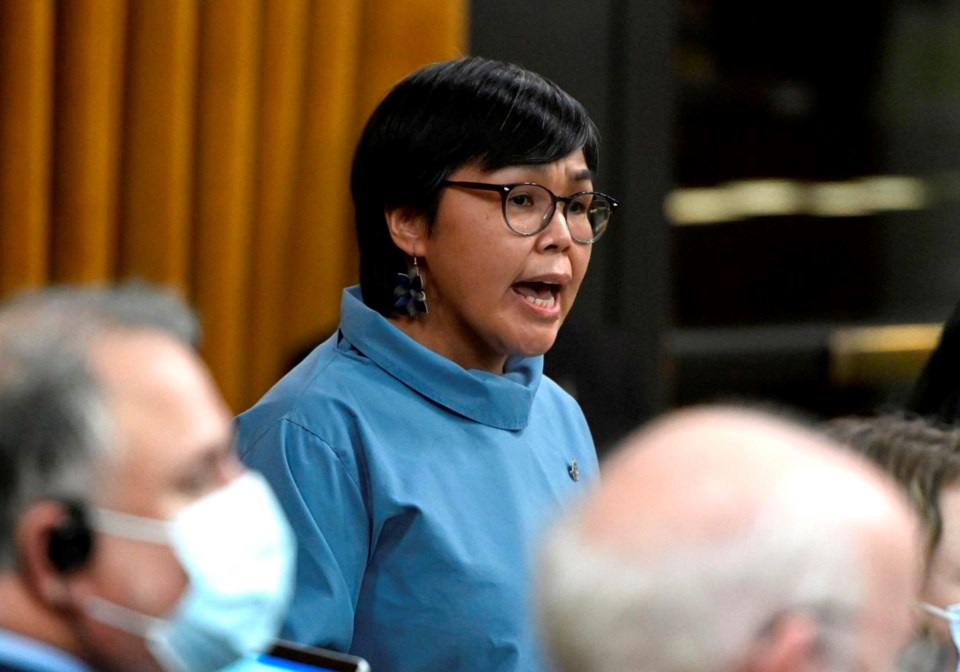Nunavut member of Parliament Lori Idlout says she felt an "overwhelming sense of relief" when she learned federal ministers had rejected a proposal to expand an iron ore mine on the tip of Baffin Island.Â
"It was great to see this decision. I welcome it and I'm very proud of the Inuit who worked hard to make sure their rights to protect the environment and the wildlife were heard," she said Thursday.
On Wednesday, Northern Affairs Minister Dan Vandal, along with several other cabinet ministers, backed a recommendation from the Nunavut Impact Review Board that Baffinland Iron Mines Corporation's Mary River Mine expansion should not proceed.
Vandal cited the board's findings that potential negative impacts on wildlife, vegetation and water as well as Inuit culture, land use and food security could not be adequately prevented, mitigated or adaptively managed under the proposal.
The decision has drawn both praise and criticism with Nunavummiut, environmental organizations and mining advocates weighing in.
The expansion would have seen annual production at the mine double to 12 million tonnes of ore, and construction of a 110-kilometre railway from the mine to the port at Milne Inlet.Â
Baffinland had said the Phase 2 expansion was needed to "effectively compete in the international iron ore markets," as prices have been subject to significant fluctuation and the railway would reduce transportation costs.
Supporters of the project touted benefits, including jobs, training, infrastructure investments and an estimated $2.4 billion in royalties. The company said the project would also mitigate the impact of current operations by reducing dust, emissions and waste.Â
But some Inuit and environmental organizations said they had lingering concerns like the impact increased shipping would have on narwhal and how the railway would interfere with traditional land use and caribou migration.Â
Many residents in Pond Inlet, Nvt., the nearest community roughly 170 kilometres away, celebrated the decision Wednesday night with fireworks and a parade of vehicles honking their horns through the hamlet's streets.
Idlout said she has received calls, emails and texts thanking her for amplifying Inuit voices.Â
David Akeeagok, Nunavut's minister of in charge of economic development, transport and the environment, along with Nunavut Tunngavik Incorporated, which represents Inuit on treaty rights, the Qikiqtani Inuit Association, Oceans North and World Wildlife Fund Canada have also publicly commended the decision. Many said while they are not opposed to development, it needs to balance the protection of Inuit rights and the environment.Â
"We are conscious that the delay of an expansion plan like Phase 2 would delay the realization of many potential economic benefits to the communities. However, a massive expansion like Phase 2 needs to be done responsibly," Nunavut Tunngavik Incorporated vice-president James Eetoolook said in a statement.
"Inuit support resource development, and we are confident Baffinland will be able to find a way forward, to continue to provide positive contributions to Inuit employment and (the) Nunavut economy."
Idlout said she encourages Baffinland to shift its focus to mitigating impacts from current mining operations and to listen to Inuit.
"This is a great opportunity to show Canada what having positive relationships with Indigenous people can look like," she said.Â
Pierre Gratton, president and CEO of the Mining Association of Canada, criticized the decision in a series of tweets Thursday, saying it doesn't provide reassurance that Canada will deliver in supplying critical minerals to its allies in Europe and the United States.
“I hope a new way forward can be found to minimize the potentially significant long-term economic harm this decision can have on Nunavut, its citizens and its future," he wrote.Â
Baffinland on Thursday also said it was disappointed with the decision, as its proposal was "based on years of in-depth study and detailed scientific analysis" alongside consulting Inuit and other stakeholders.
"Given the clear benefits to Inuit, Nunavut and Canada as a whole, and the fact that Baffinland high-grade ore is also the greenest path to steel production, the minister's decision is both surprising and disappointing," CEO Brian Penney said in a statement.Â
Baffinland said it's the largest single contributor to Nunavut's economy and the decision has "immediate and significant implications" for the mine and its workforce. The company said it currently employs 2,500 people at the mine, 350 of whom are Inuit.Â
Baffinland said it plans to meet with the Qikiqtani Inuit Association and minister Vandal to "discuss a practical path forward."
Vandal in a statement Wednesday encouraged Baffinland to continue working with partners to apply for a new project.
He also said Baffinland currently has approval to ship 18 million tonnes of iron ore per year through a southern route to Steensby Inlet, but has not moved forward on that project.
This report by The Canadian Press was first published Nov 17, 2022.
___
This story was produced with the financial assistance of the Meta and Canadian Press News Fellowship.
Emily Blake, The Canadian Press



